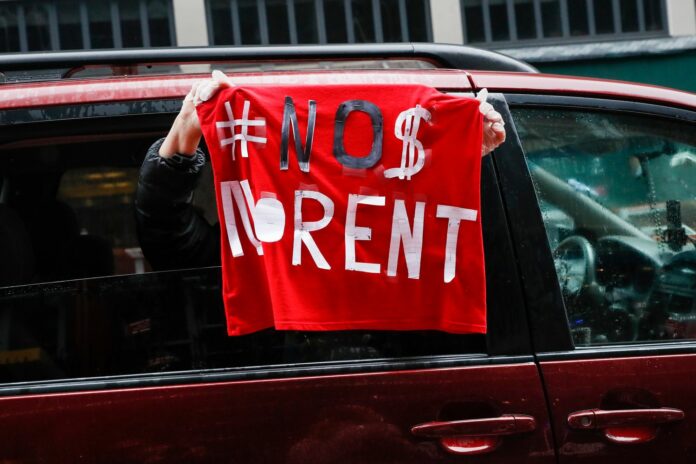A sign with the message to cancel rent at a New York City protest in May. | AP Photo/John Minchillo
Columbus, Ohio, has turned part of its convention center into an evictions court. Denver is creating a handful of designated campsites for homeless people. And Milwaukee saw a 17 percent increase in eviction filings last month after a state ban lapsed.
Cities across the country are bracing for a surge of evictions as a four-month federal moratorium that has protected millions of tenants from losing their homes in the middle of the pandemic expires Friday at midnight, with no relief in sight from Congress.
The ban is ending just as a federal enhancement to unemployment benefits — a $600-a-week boost that has helped many laid off tenants pay at least some of their rent — also lapses this weekend. Estimates of the number of people who stand to lose their homes are rough, given the patchwork of state and local bans on evictions, many of which are also expiring. But they range in the millions, and a disproportionate share of them are people of color.
“The wave of evictions has already begun, and now Congress needs to act to prevent it from becoming a tsunami,” said Diane Yentel, president and CEO of the National Low Income Housing Coalition.
“If the federal ban is not extended, if the state and local eviction moratoriums that are scheduled to expire in the coming weeks do, and if no emergency rental assistance is provided, then from the end of August through fall, millions of Americans will be evicted from their homes,” Yentel said.
The federal eviction ban, included in the $2 trillion CARES Act legislation passed by Congress in March, covers all tenants living in buildings that have mortgages guaranteed by the U.S. government. It does not provide help to the majority of tenants who live in buildings with privately backed mortgages.
While states have imposed their own eviction moratoriums, 24 of them have already allowed the temporary bans to lapse. That leaves somewhere between 19 million and 23 million people — about one in five renters in the U.S. — at risk of eviction by the end of September if Congress fails to extend both the federal ban and supplemental unemployment benefits, according to an estimate by the Aspen Institute.
The situation was dire even before both protections lapsed: Roughly 9.4 million renters have no confidence they will be able to make next month’s rent payment, according to the latest weekly survey by the Census Bureau, conducted the second week of July. Another 14.3 million have only “slight” confidence they will be able to make rent next month.
Congressional Democrats have been pushing for rental relief. The House late last month passed an emergency housing bill from Financial Services Chair Maxine Waters (D-Calif.) that would extend the federal eviction ban until March 2021 and allocate $100 billion for rental assistance. The bill had been part of the $3 trillion rescue package that House Democrats passed in May.
In the Senate, Sherrod Brown of Ohio, the top Democrat on the Banking Committee, introduced a companion bill to the Waters legislation. And Sen. Elizabeth Warren (D-Mass.) also proposed legislation extending the ban through March 2021.
The Republican-controlled Senate has not taken up any of the bills.
After talks with the White House on the next economic rescue package stalled on Thursday, Senate Majority Leader Mitch McConnell said Republicans would release their proposal for the legislation “early next week.” But GOP lawmakers are still split over unemployment benefits, and the leadership has not made rent relief a priority.
Brown on Thursday excoriated McConnell on the Senate floor for letting the House moratorium bill “collect dust” on his desk.
“Right now, millions of Americans are in danger of losing their homes,” Brown said. “The last thing we need in the middle of a public health crisis is families being turned out on the streets.”
The Senate adjourned hours later, allowing the federal ban — which covers about 12 million households — to expire as scheduled on Friday.
There’s still a grace period, though. Under the CARES Act, landlords who were subject to the ban must give tenants 30 days’ notice before filing eviction papers in court.
“Families won’t actually be pushed out of their homes until the end of August, so there is still an ever-closing window where Congress can act,” said Yentel, who is leading a coalition of housing groups to pressure lawmakers for additional relief.
Relief efforts so far have prevented a dramatic drop-off in rent payments, despite tens of millions of Americans losing their jobs: 91.3 percent of apartment households had made a full or partial rent payment for this month as of July 20, according to the National Multifamily Housing Council — down just 2.1 percentage points from this time last year, and roughly in line with the 92.2 percent who had paid by mid-June.
But that’s sure to change quickly if Congress fails to reinstate the $600-per-week supplemental unemployment benefit after it lapses.
With the current benefits, just 3 percent of renter households are “severely housing burdened,” meaning they pay more than 50 percent of their incomes toward rent, according to a Zillow analysis of rental households impacted by the crisis released on Thursday. Losing the federal benefit, even if state unemployment benefits hold steady, would cause the severely burdened share of tenants to skyrocket to 41 percent, Zillow found.
“Right now, we’re in a situation where people will be evicted from their homes,” said House Speaker Nancy Pelosi in an MSNBC interview Friday. “People will be on the street, and people are hungry. This is the United States of America. So let’s find out how we can work together to go forward.”






